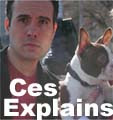Today's Tribune, Sun-Times and Daily Herald all cover the death penalty bill, sponsored by House Minority Leader Tom Cross (R-Oswego), that was narrowly approved by the House Judiciary Criminal Law committee:
But the proposal is not without its critics:[T]he bill would create a unique two-tiered standard for murder convictions. Juries would be instructed to weigh whether a defendant was guilty beyond a reasonable doubt when rendering a verdict. But in deciding whether the death penalty is warranted, juries would have to apply a tougher standard, concluding beyond "all doubt" that the defendant was guilty. If unable to reach that consensus, juries would have to impose a life sentence. (Trib)
"What this bill does is create some uniformity around the state ensuring that if we're going to sentence somebody to death that you have everything in place, that the jury's convinced and that there's no doubt," Cross said. (D.H.)
And it seems that death penalty proponents and abolitionists may both be using this bill to advance their respective positions:Cook County State's Attorney Richard Devine and DuPage County State's Attorney Joe Birkett testified against the measure, saying the proposal could hopelessly complicate capital trials. *** Birkett, a possible contender for the 2006 GOP nomination for governor, predicted the bill would open up a Pandora's box of legal complications. He said some jurors might say that nothing is ever completely certain, even facts that appear obvious, and that prosecutors might overreach in the sentencing phase. (S.T.)
"We certainly have no objections to the quest for certainty, but this is an open invitation for defense attorneys to argue anything they want," DuPage County State's Attorney Joe Birkett said. (D.H)
Devine said legislators should start talking about whether to abolish capital punishment. "We're living in a hypocritical situation, and this is only going to add to the hypocrisy," Devine said. "If people are truly concerned about the death penalty, and I understand that there are many different views on it, I think we should have that debate. And I think we should decide, Are we going to have a death penalty?" (Trib)
Adding further confusion to this situation is the assertion by Joe Hoffmann, law professor at Indiana University, that "no doubt" doesn't actually mean "NO doubt."Some critics suggested the bill, pushed by Cross and four other pro-death penalty lawmakers, was a surreptitious way of weakening the moratorium, which Cross denied. (S.T.)
Although Cross supports the death penalty, proponents of the bill were mostly against it. One lawmaker admitted he was only voting for the bill because it emphasizes the futility of trying to create a foolproof system of capital punishment. I'm going to vote 'yes' on this bill because I think it does add to the hypocrisy, I really do," said Rep. Robert Molaro (D-Chicago), chairman of the committee. (Trib)
Having no doubt "is not the same thing as saying there's a 1 in 4 billion chance, or if aliens could have come down and planted the evidence against the defendant that you want to say there's doubt. *** Jurors aren't that stupid." (D.H.)But the meaning of "no doubt" isn't a matter of juror "stupidity." As this article shows, even intelligent citizens can be confused -- or even mislead -- when it comes to questions of very extreme probabilities.
So give the article a look and see if you have the math skills necessary to properly calculate the probability of someone's guilt.
And then remember that it is exactly those calculations that are necessary for a jury of your peers to properly determine a defendant's absolute guilt or innocence, i.e. "no doubt." Anything less is not "actual certainty" but merely "an illusion of certainty. "
I think you will conclude that 1) an actual "NO doubt" standard is the proper standard for the State meet before killing people, 2) the degree of certainty required for a "NO doubt" standard is unobtainable in a real world, courtroom setting, and therefore 3) the State should not engage in killing people.
Some may accuse me of over-thinking this, but when it comes to making previously living people irrevocably dead, I don't think you can give the issue too much thought.













No comments:
Post a Comment